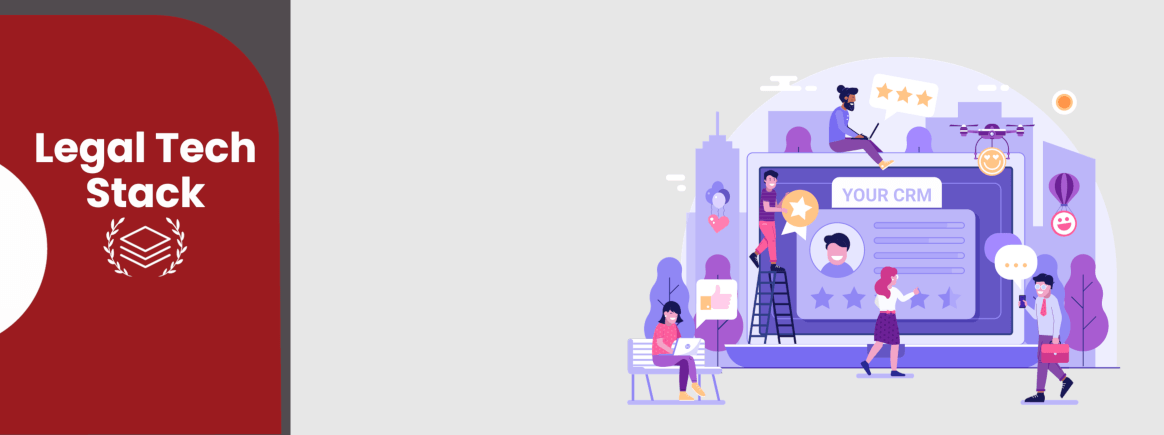
Obtaining and Retaining Clients: How a CRM Benefits Law Firms
Introduction
In the rapidly evolving legal landscape, law firms must use all the tools at their disposal to stay competitive and deliver top-notch services to their clients. One crucial tool that has gained prominence in recent years is Customer Relationship Management (CRM) software. While traditionally associated with sales and marketing, CRMs have proven invaluable for law firms, fostering stronger client relationships, streamlining operations, and ultimately, increasing profitability. In this blog post, we will explore how a law firm can benefit from using a CRM.
In the rapidly evolving legal landscape, law firms must use all the tools at their disposal to stay competitive and deliver top-notch services to their clients. One crucial tool that has gained prominence in recent years is Customer Relationship Management (CRM) software. While traditionally associated with sales and marketing, CRMs have proven invaluable for law firms, fostering stronger client relationships, streamlining operations, and ultimately, increasing profitability. In this blog post, we will explore how a law firm can benefit from using a CRM.
Enhanced Client Management
Client satisfaction is paramount in the legal industry. A CRM system helps law firms organize and centralize client data, providing easy access to critical information such as contact details, case history, and communication records. This central repository ensures that lawyers and support staff can provide personalized and efficient service, making clients feel valued and understood.
Improved Communication
Effective communication is the cornerstone of client relationships. CRMs enable law firms to automate email campaigns, appointment reminders, and follow-ups, ensuring that no client is left unattended. Furthermore, the ability to track email interactions allows lawyers to stay on top of important conversations and respond promptly, bolstering trust and accountability.
Streamlined Case Management
Managing legal cases can be a complex and time-consuming task. CRMs can help law firms streamline case management by providing tools for tracking deadlines, court dates, and document management. This reduces the risk of missed deadlines and ensures that lawyers are well-prepared for court appearances and client meetings
Targeted Marketing and Business Development
Law firms can benefit from CRM's marketing capabilities by segmenting their client database based on various criteria such as practice area, location, or industry. This allows for the creation of targeted marketing campaigns and the identification of cross-selling opportunities. A CRM system can also track the success of these campaigns, helping firms refine their marketing strategies over time.
Data Analytics for Informed Decision-Making
Data-driven insights are crucial for law firms seeking to make informed decisions. CRMs provide analytics and reporting features that allow firms to track key performance indicators (KPIs) such as client acquisition costs, case closure rates, and revenue per client. By analyzing these metrics, firms can identify areas for improvement and adjust their strategies accordingly.
Increased Efficiency and Productivity
Efficiency is paramount in a competitive legal market. CRM software automates routine administrative tasks such as data entry, appointment scheduling, and document management, freeing up lawyers and staff to focus on billable work and strategic tasks. This boost in productivity can have a direct impact on a firm's bottom line.
Secure Data Management
Client confidentiality is sacrosanct in the legal profession. CRMs provide robust security measures to protect sensitive client data from breaches and unauthorized access. This level of data security is essential for maintaining client trust and complying with legal and ethical standards.
Conclusion
In today's dynamic legal environment, law firms must leverage technology to stay competitive and deliver exceptional service. A well-implemented CRM system can revolutionize how a law firm manages client relationships, streamlines operations, and drives growth. By enhancing client management, improving communication, streamlining case management, enabling targeted marketing, offering data analytics, increasing efficiency, and ensuring data security, CRM software is a powerful ally for law firms seeking to thrive in the digital age. Embracing CRM technology is not just an option; it's a strategic imperative for law firms looking to remain at the forefront of the legal industry.
In today's dynamic legal environment, law firms must leverage technology to stay competitive and deliver exceptional service. A well-implemented CRM system can revolutionize how a law firm manages client relationships, streamlines operations, and drives growth. By enhancing client management, improving communication, streamlining case management, enabling targeted marketing, offering data analytics, increasing efficiency, and ensuring data security, CRM software is a powerful ally for law firms seeking to thrive in the digital age. Embracing CRM technology is not just an option; it's a strategic imperative for law firms looking to remain at the forefront of the legal industry.
You may also like
Happy Holidays Message from David Swadden, CEO
December 18, 2025
We would like to wish all our clients and readers a wonderful holiday season filled with joy and laughter.
Tracument Holiday Schedule
December 11, 2025
We would like to update all our clients of our Holiday Schedule this holiday season!
Tracument Wrapped!
December 4, 2025
What 2025 Looked like for Tracument and for you!




